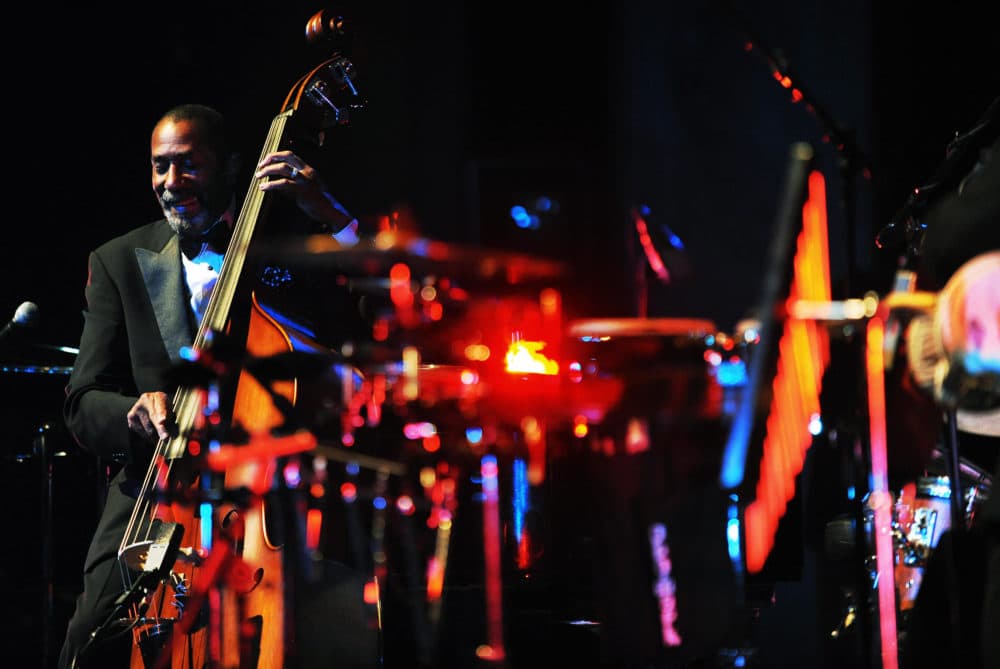Advertisement
Legendary jazz bassist Ron Carter is going on 85 and still going strong

Editor's Note: This segment was rebroadcast on August 19, 2022. That audio is available here.
Grammy-winning jazz bassist Ron Carter plans to celebrate his 85th birthday with a concert at Carnegie Hall on May 10.
According to the Guinness Book of World Records, Carter is the most recorded jazz bassist with over 2,200 sessions.
Interview Highlights
On the hardest part of the job over his six-decade career
"The hardest part of this job, if there’s any more difficult parts of this job is have I retained the ability to make someone else sound good. That’s my priority. I do what I do and I’m happy to try to make those efforts, but my job is to make those people who hired me — make them sound good. Make them sound better. Make them like my input to their project that they made the right choice in calling me. And I deliver for them the moment they give me the downbeat."
On why he switched to the bass after starting out as a child playing the cello
"Well, back in what they called the day, African-American classical musicians of whatever classical music they were playing, they were not really encouraged to continue that occupation ‘cause there were no jobs that people would hire a minority or a person of color. I’m in … my senior year in high school, most of the public events they would call around to various high schools to put together a small ensemble to make some wallpaper noise during the course of the clinking of glasses, stuff like that. I looked around after the first couple of semesters and I wasn’t getting those calls and clearly I thought I was capable of doing the work. One day I looked around and noticed the bass player was going to graduate the spring semester of 1955. I decided they’d have to call me because I’d be the only guy playing bass. So I sold my cello, got a teacher, and I was the guy they had to call for these small music jobs that were a part of growing up and playing music."
Advertisement
On the essential skills needed for bass
"I think one of the things is necessary is musicianship. I consider that to mean the ability and the desire to hone your skills, both physical and emotional, that you’re willing to help the project be fruitful. In New York, in this case, you have to learn to read music really well. In New York, you need a certain skill level that allows you to play various musical interpretations, to read the score, to understand what the parts mean. Punctuality: When the gig is at 8 o’clock, if you get there at 7:15, you’re already an hour late. In New York, it means having your instrument ready to play and in wonderful playing condition. These are some of the things that I’ve made a point to do throughout my career and I encourage anyone who wants to kind of do what we do in New York, these are some of the things they must have in their toolbox."
On the incredible musicians that he's worked with
"Wait, wait, I’m not going to do that because you’re going to miss some people. And I don’t want you to be on the bad list of those people. There’s 2,000 plus people who I made records as a side-man … if you don’t get all of them at least a chance for me to talk about them personally, that you’ll be a bad person … It’s just like people want to know, the stories that they hear about certain of the people I’ve worked with and I tell those people, 'I don’t know those people you speak of through that situation, I know them from … nine to five, or nine to three, or one to two. I know them for that space of time.' "
On the difference between the music and musician's personal lives
"They’re not separated!"
"If the guy’s a drag or she’s a drag, they’re going to be a drag to you as well when you get to the gigs … I think that’s so tied in, it’s hard to turn off the bad spigot for this one guy who’s playing bass."
On what he looks for in a musical partner
"I look for someone who trusts my musical judgment implicitly. For example, if they want an F for the downbeat of every beginning of every chorus, they know I’m capable of doing it, that’s why they hire me. But they also like the surprises I’m able to bring to the table. So rather than play an F on the downbeat, I may play any other note, A or C of the chord or E Flat or some other note. They have to understand that this is what I’m hearing in my attempt to make them sound better. And I’m using my experience, I’m using my talent, I’m using my ability to see a bigger picture than just me and them. Can I make an impression on the music with their help of giving me their attention to make it, take it somewhere else — that I’m hired to do that. And I hope that they trust my judgement enough to — they may blink, I hope (if) they do they know (it) means I have them in my back pocket."
On his versatility — and ability to play Billy Joel or A Tribe Called Quest and sound just as authentic
"I think I understand what I think their music needs. I’m not just involved with the local jazz stations, listening to my music, or when I’m home in my house I don’t just listen to the next jazz record. I listen to music with a capital M. And that means people like Billy Joel, like the Young Rascals, [A] Tribe Called Quest. I want to know what they do, I want to know how is it they’re able to garner such applause. And when I get a chance to play with them, I get a chance to see what they do that makes people come out in those numbers. My job is to kind of understand what music they’re playing, how fast they pick the tempos, what key they pick, are they singing in their specific register to sound really great. Are they trying a new sound that they think I may be able to help them do. My job again is, as I said earlier, is to make them sound great and to do that I have to have a sense of what they’re aiming for."
On who he's listening to
"Right now I’m listening to Bach Brandenburg number three which I made a record with. I’m starting to love what I tried to do."
On how his sound has evolved over six decades of playing?
"Things have changed despite me. They have great amplifiers now to amplify good sound. They have better cables to transmit the sound from the bass pickup to the amplifier. There’s great brands of strings I have stumbled on over the past 25 years that make me able to create the sound that I hear on Monday be able to play it on Tuesday through Saturday. I’ve learned how the bass functions. I’ve learned how to play the bass better, I know where the sweet spots are on the instrument and after all this time. I found them maybe three or four times and it’s really a great thing to know I’m able to coax the bass to play something that the weather says is not possible because it’s now cold out and the bass is literally physically changing before my very eyes."
On whether jazz is an old-fashioned, dying art
"If I could get them all in one room, I’d make them sit down and listen to a program of mine, Carnegie Hall, May 10, 85th birthday concert. Now I’d ask them, if you can really sit there and tell me that these three ensembles and the music they’re playing ... is dead ... I’ll move over in the grave, I’ll join you."
Emiko Tamagawa produced and edited this interview for broadcast with Todd Mundt. Tamagawa adapted it for the web.
This segment aired on March 21, 2022.

